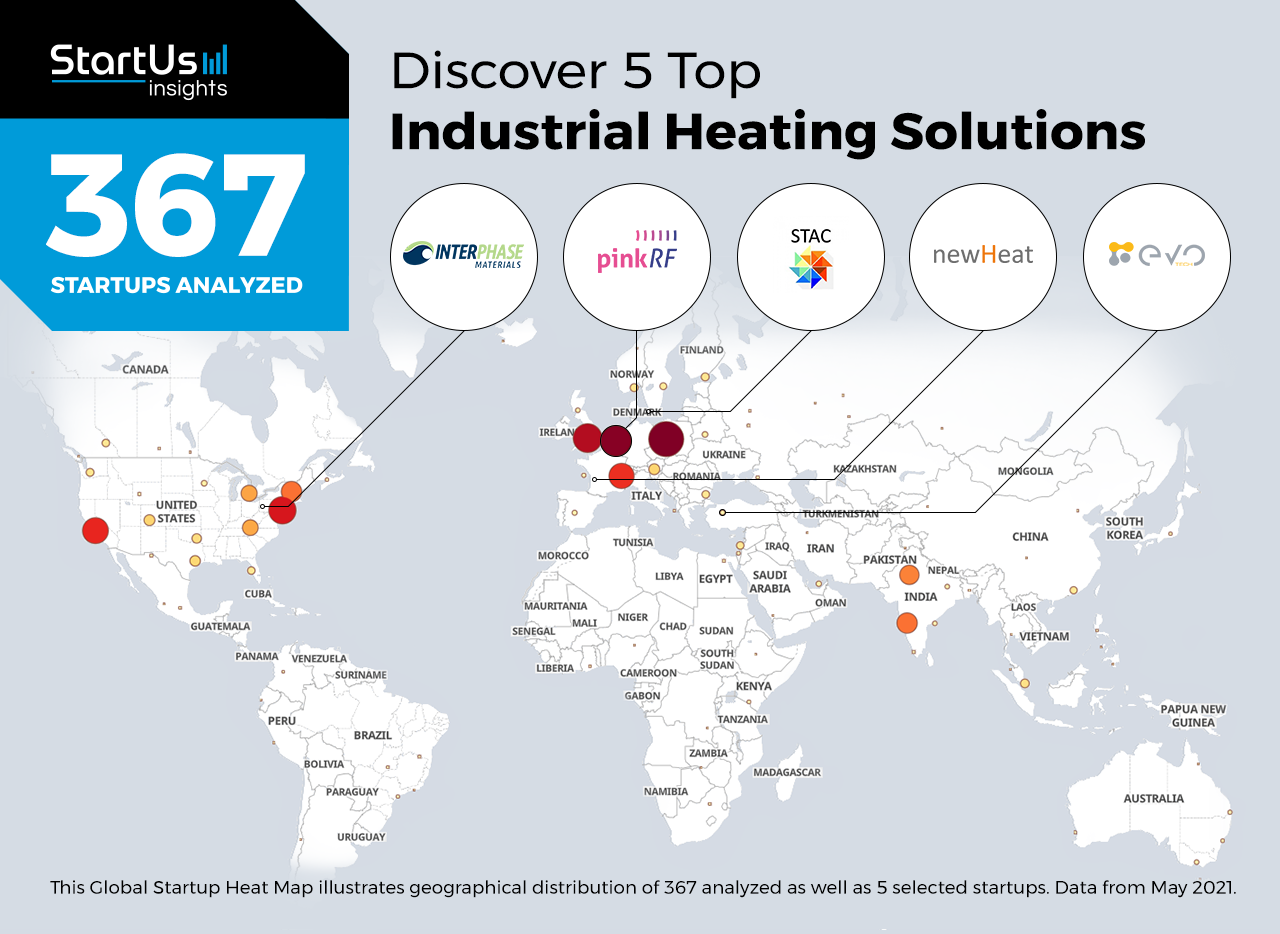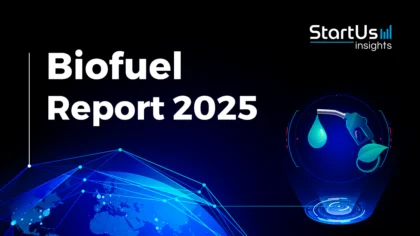Staying ahead of the technology curve means strengthening your competitive advantage. That is why we give you data-driven innovation insights into the energy industry. This time, you get to discover 5 hand-picked industrial heating solutions.
Global Startup Heat Map highlights 5 Top Industrial Heating Solutions out of 367
The insights of this data-driven analysis are derived from the Big Data & Artificial Intelligence-powered StartUs Insights Discovery Platform, covering 2.093.000+ startups & scaleups globally. The platform gives you an exhaustive overview of emerging technologies & relevant startups within a specific field in just a few clicks.
The Global Startup Heat Map below reveals the distribution of the 367 exemplary startups & scaleups we analyzed for this research. Further, it highlights 5 energy startups that we hand-picked based on criteria such as founding year, location, funding raised, and more. You get to explore the solutions of these 5 startups & scaleups in this report. For insights on the other 362 industrial heating solutions, get in touch.
STAC Technology delivers Water-Powered Heating Solutions
Traditional heating, ventilation, and air conditioning (HVAC) systems rely on vapor-compression or refrigerants like R-12 or R-22 for cooling. The prolonged use of these systems is not viable in the long term as they contribute to global warming. This necessitates the need for alternative cooling methods. Startups are exploring sustainable options, such as using water as a refrigerant to improve energy efficiency and reduce costs.
Danish startup STAC Technology advances turbo compressors that use water (R718) as the refrigerant in industrial spaces. Its technology improves decentralized HVAC systems that use water as the refrigerant. The startup’s water-based cooling technology enables phase changes that rapidly achieve heating and cooling. Coupled with the turbo compressor, the solution helps industries and governments utilize an optimal, cost-effective, and energy-efficient solution to mitigate the impact of climate change. STAC Technology’s plug-and-play HVAC solutions allow companies to expand geographic reach and accelerate new product development.
Interphase Materials provides Advanced Materials for HVAC
In common practice, surfaces of HVAC devices are not engineered to optimize heating and cooling. This leads to loss of energy and an increase in expenses, in the form of maintenance and heating losses. Optimizing the materials that are used for industrial heating allows companies to extend the life of HVAC devices. Startups design materials for HVAC systems to ensure there is reduced fouling of equipment and increased efficiency in usage.
Interphase Materials is a US-based startup developing advanced materials for HVAC systems and devices. Thermophase, the startup’s biocide-free surface treatment, protects heat transfer surfaces from inorganic and organic fouling, promotes cleanliness, and enhances heat transfer. It is useful in chillers, heat exchangers, and cooling towers to improve the efficiency of the HVAC process. The startup also provides Discoverphase, a material analytics service, and Intelliphase, a data analysis tool to optimize industrial heating processes through materials engineering.
EvoTech designs Electric Fan Heaters
The risk of refrigerant spillage is a health hazard, especially in industrial settings. Spills happen due to multiple reasons including breaks in tubes, overheating, device maturity, and decay, all contributing to environmental pollution. On the other hand, electric heaters do not use such refrigerants and prevent exposure to harmful chemicals. Startups develop electric heating solutions that also allow temperature control and precision heating.
Turkish startup EvoTech designs and delivers industrial-grade electric fan heaters. It offers different electric heater models, ranging from a heating capacity of 3KW to 40KW, with a maximum heating capacity of up to 860 sq. m. Further, the heater features in-built wheels, allowing easy transport to different parts of the workspace. The startup also offers solutions for HVAC based on diesel heaters, panel air conditioners, duct-type heaters, and industrial electric and diesel heaters.
newHeat optimizes Waste-Heat Recovery
Due to inefficiencies that arise during the life-cycle of HVAC systems, companies routinely incur high costs due to heat loss. This waste heat is not utilized and leads to greater energy expenditure for heating. Rerouting lost heat through water pipes is one of the many ways to address waste heat recovery. Startups work on solutions to recover this energy and increase the efficiency of an HVAC system.
French startup newHeat delivers end-to-end industrial waste heat recovery solutions. After performing an analysis of the existing framework, newHeat achieves waste heat recovery through three main processes: creating hot water loops, preheating airflow, and providing storage to utilize the recovered waste heat. The startup also provides solar thermal fields to supplement existing heating systems, providing a customized solution based on the requirements for each industrial site.
PinkRF uses Radio-Frequency (RF) Technology
Natural limitations of chemical reactions prevent traditional HVAC technologies from reaching high temperatures. RF-based heating is widely applicable, especially in the heating of good conductors of heat, and uses microwave technology to achieve industrial heating. Startups and scaleups provide RF technology solutions in industrial settings to allow companies to heat materials that traditional HVAC systems are unable to heat.
Dutch startup PinkRF provides RF ovens for industrial applications. RF ovens enable volumetric heating and faster processing than conventional HVAC techniques. Whereas traditional RF ovens use large magnetron tubes, PinkRF provides a solid-state solution that increases the lifespan of the ovens and allows for controlled energy delivery. The startup also provides RF solutions for plasma applications, automotive ignition, and hyperthermia.
Discover more Energy Startups
Energy startups such as the examples highlighted in this report focus on blockchain, decentralization, decarbonization as well as renewables. While all of these technologies play a major role in advancing the energy industry, they only represent the tip of the iceberg. To explore more energy technologies, simply get in touch to let us look into your areas of interest. For a more general overview, you can download our free Energy Innovation Report to save your time and improve strategic decision-making.









